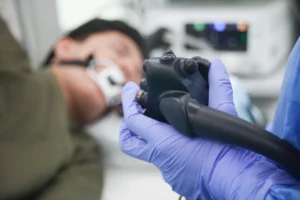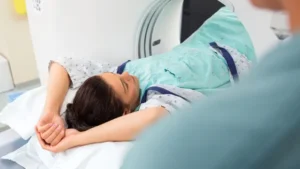Key Takeaways:
- Blood in stool can range from harmless (like piles or fissures) to serious (like polyps, ulcers, or cancer).
- The colour and amount of blood provide important clues about the source.
- Seek urgent medical help if bleeding is heavy, persistent, or accompanied by other symptoms such as dizziness, pain, or weight loss.
- A doctor may recommend tests such as stool analysis, blood tests, colonoscopy, or gastroscopy.
- Prevention includes a high-fibre diet, hydration, and avoiding straining.
Noticing blood in your stool can be alarming, but it is a symptom that should never be ignored. While in many cases the cause may be minor, such as piles or a small tear in the anal lining, blood in the stool can also indicate more serious digestive conditions. Understanding the possible causes, when to seek medical attention, and what steps doctors may take can help you approach the situation with clarity and confidence.
Common Causes of Blood in Stool
Blood in the stool may appear bright red, dark red, or even black and tarry. Each type can suggest a different source of bleeding:
- Haemorrhoids (Piles): Swollen veins in the anus or rectum that bleed, especially after straining.
- Anal Fissures: Small tears in the anal lining, often causing pain and streaks of bright red blood.
- Diverticular Disease: Pouches in the bowel wall that can bleed or get inflamed.
- Polyps or Cancer: Growths in the colon or rectum that can sometimes bleed.
- Gastrointestinal Conditions: Such as ulcers, colitis, or inflammatory bowel disease (IBD).
When to Seek Medical Attention
Occasional streaks of blood may not be serious, but you should see a doctor promptly if you notice:
- Large amounts of blood or frequent bleeding
- Black, tarry stools (possible bleeding higher up in the gut)
- Unexplained weight loss or fatigue
- Persistent abdominal pain or changes in bowel habits
If bleeding is heavy or accompanied by dizziness and weakness, go to the emergency department immediately.
How Doctors Diagnose the Cause
Your doctor may recommend:
- Physical examination to check for piles or fissures
- Stool tests to rule out infection or hidden bleeding
- Blood tests to check for anaemia
- Endoscopic procedures such as colonoscopy or gastroscopy, to examine the digestive tract and locate the source of bleeding
Treatment Options
Treatment depends on the cause:
- Haemorrhoids and fissures: May be treated with creams, dietary changes, or minor procedures
- Polyps or growths: Often removed during colonoscopy
- Inflammatory conditions: Managed with medication and lifestyle changes
- Severe bleeding: May require hospital care or surgery
Self-Care and Prevention Tips
While awaiting medical care or after treatment, you can reduce your risk of recurrence by:
- Eating a high-fibre diet (fruits, vegetables, whole grains)
- Drinking plenty of water
- Avoiding excessive straining on the toilet
- Limiting alcohol, processed foods, and very spicy meals if they worsen your symptoms
FAQ: Blood in Stool
Is blood in stool always cancer?
No. The most common causes are piles or fissures, which are usually harmless. However, persistent or unexplained bleeding should always be checked to rule out cancer or other serious conditions.
Can stress cause blood in stool?
Not directly. Stress can worsen conditions like irritable bowel syndrome (IBS), but it usually doesn’t cause bleeding. If you see blood, the cause is likely physical and should be assessed by a doctor.
What colour of blood should I worry about most?
- Bright red: Often from piles or fissures near the anus.
- Dark red or black: May suggest bleeding higher up in the digestive tract, such as the stomach or small intestine, and needs urgent evaluation.
How soon should I see a doctor?
If the bleeding is heavy, recurrent, or associated with symptoms like pain, dizziness, or weight loss, seek care immediately. For small but persistent amounts, book a medical appointment within days.
When to See a Specialist – GastroClinic
If you’ve noticed blood in your stool, whether just once or repeatedly, it’s best not to delay. At GastroClinic, our specialists provide comprehensive assessments, including colonoscopy and gastroscopy, to determine the cause and recommend the right treatment.
Book an appointment with GastroClinic today for peace of mind and personalised care for your digestive health.













